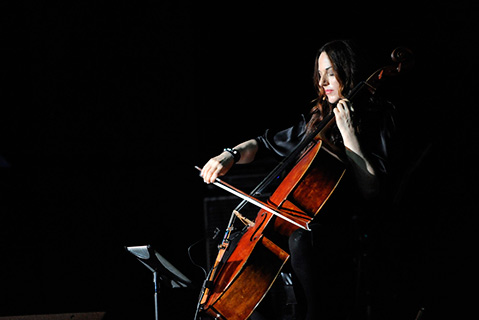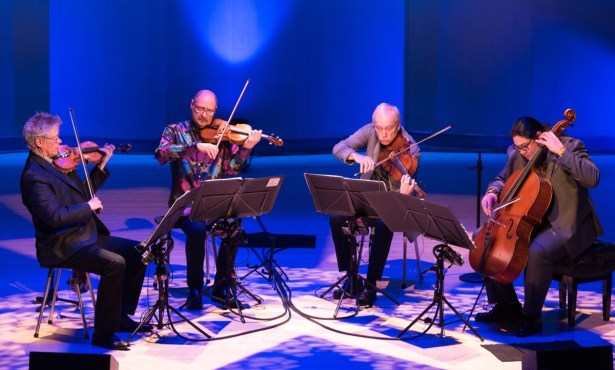Review: Ojai Music Festival 2015
Schick Happens in Ojai

The Ojai Music Festival has always been friendly to influences from outside the Western tradition, but this year’s edition took things a step further by ushering in so much of the so-called “outside” as to render the distinction temporarily invalid. As in his own extraordinary solo performance on Friday evening, 2015 Music Director Steven Schick created a sonic world out of the vast array of instruments laid out for him by the various ensembles and musicians on hand. From the rigorous classical discipline of the strings in the Calder Quartet to the elaborate batteries of percussion deployed by red fish blue fish, and from the single-instrument virtuosity of pipa player Wu Man and cellist Maya Beiser to the democratic sounds of audience members clicking away on small stones, the 2015 Ojai Music Festival wove together a tapestry of sound that seemed ready to start anywhere and end everywhere.
Celebrating the 90th birthday of the great French innovator Pierre Boulez was one strand of the festival, while investigating the overlap between music and physical theater was another. Electronics, prerecorded loops, and digital-delay devices were employed freely, but so were such pre-digital sound technologies as tearing paper and rattling rocks. For example, Friday evening’s main concert was divided into two parts, a Bartók-Boulez pairing and a feature for Schick as a solo percussionist.
Bartók’s string quartets are quintessential Ojai Festival material — dense and astringent, they offer a high return on the considerable investment of the listener’s attention they demand. The Calder Quartet was born to parse the intricacies of such music, and on Friday, they played numbers 3 and 5 with equal fidelity and brio. Placed between these two imposing examples of 20th-century string-quartet composition, the Dialogue de l’ombre double of Pierre Boulez went off like a firecracker. With electronic samples cascading through the audience from multiple speakers placed around the Libbey Bowl, clarinetist Joshua Rubin performed a score that had him interacting with a digital shadow of his instrument in what Boulez refers to as “spatial theater.”
Schick’s solo set gave new life to the tired notion of a tour de force performance. Surrounded by thousands of instruments, Schick powered through seven dense compositions without the aid of a score. In the process, he educated his audience in the eclectic sounds of the contemporary repertoire for solo percussion. Two works by Iannis Xenakis, Rebonds and Psappha, anchored the program at either end, indicating the seminal status of Xenakis in this arena.
Schick’s penultimate solo piece, Vinko Globokar’s ?Corporel, was the most talked about, as it required the performer to shed not only his arsenal of sticks and mallets but also his shirt. Sitting and eventually lying on a resonant platform amplified with microphones, Schick rubbed, slapped, tapped, and knocked on his head and chest while emitting a wide range of nonverbal noises. At one point, while laying flat on his back, he even threw in some snores. He also spoke the piece’s only words: “I recently read the following remark: ‘Human history is a long sequence of synonyms for the same word. It is our duty to disprove this.’” In searching for an example of this ongoing quest for the non-synonymous, one could hardly do better than the Ojai Music Festival.



